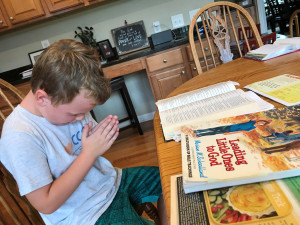There is enough of an age spread between our oldest and youngest children that I find myself circling back with the younger ones to make sure they are also benefiting from some of the things their older siblings learned.
Sometimes it’s rough! Take the time I realized a certain four-year-old of mine didn’t know the nursery rhymes. Oops! I had faithfully read them to her older sisters but had failed to read them to her. Thankfully, we bought a CD, and she listened to them at night in her room. Soon she knew the nursery rhymes better than anyone else did. (It will come in handy someday when she is playing a baby shower game!)
Lately I have been circling back to some of the books we have covered in our Bible time as a family in the past, and we have been once again enjoying the lessons and insights with our younger kids, so I thought I’d share what we have used.
Pre-School and Young Elementary Grades
It’s a classic and it’s no wonder why. Leading Little Ones to God by Marian M. Schoolland is wonderful. This readable book with short chapters has questions for kids to answer at the end, a scripture, and a prayer to say together. It covers numerous theological topics in a way that is relatable and understandable for young children.
God’s Names by Sally Michael is a treasure. We can learn a lot about who God is by studying His names in Scripture, and this book covers this topic in such a practical and inspiring way for kids.
Big Truths for Little Kids: Teaching Your Children to Live for God by the Hunts has also been helpful. It essentially goes through the First Catechism and integrates some stories to make it more relatable for kids. It also has discussion questions, a featured scripture, and prayer suggestions.
AWANA is a wonderful and popular Bible program we have used to help keep our kids accountable to memorize scripture and learn truths in the Bible. Plus, they love it!
The Jesus Storybook Bible by Sally Lloyd-Jones is definitely not the only Bible storybook I would read to kids, because the author takes a lot of artistic license in her descriptions of scenery and feelings, although not with doctrine or the essential elements of the story. But having said that, there is no other Bible storybook I have read to the kids that better summarizes the big picture of the Bible and God’s plan for redemption and its breathtaking beauty and awesomeness. We love this book, and it makes us love and appreciate God’s plan in the Bible when we read it.
I would like to also add that we should never shy away from reading the actual Bible itself to our small children. God’s word is for everyone, and it is always effective, no matter how small the person is. Also, I have noticed that kids are quick to pick up on things I would think are “way over their head.” So don’t neglect to read them God’s word itself.
Mid-to-Late Elementary Grades
All of the above resources are good for mid-elementary kids too. Starting around third grade, we have also used Memoria Press’s Christian Studies books as a part of the kids’ homeschool Bible curriculum.
I like this curriculum because it divides the Bible into three sections—two books/years for the Old Testament and one book/year for the New Testament—and encourages the kids to think more deeply about the Bible stories and topics. It also encourages memorizing verses from the section of scripture they are reading at the time. So, when learning about the invasion of Canaan and the fall of Jericho, the kids memorize Joshua 1:9, for instance.
Middle School Grades
My middle school girls are still benefiting from some of the Memoria Press Christian Studies books, and they also participate in a weekly Bible study that includes homework, where they are encouraged to read and study the actual Bible itself. Bible Study Fellowship (BSF) and Community Bible Study (CBS) are two groups that have weekly Bible studies for kids, usually in the evenings. CBS has one specifically geared for middle-schoolers called ETeen.
I am also currently reading out loud The Case For Christ (Student Edition) by Lee Strobel, which covers some basic Christian apologetics and is engaging for kids. We have enjoyed reading this together, and it has sparked some good conversations.
Training Hearts, Teaching Minds: Family Devotions Based on the Shorter Catechism has also been helpful in teaching the themes and truths of the Bible.

Carson, age 5, praying after Bible time.
What books have you used with your kids to help instill a deeper knowledge of the Bible? I would love your recommendations as well!
—Amy
Photo Credit: Stock image. Following image courtesy of author.

